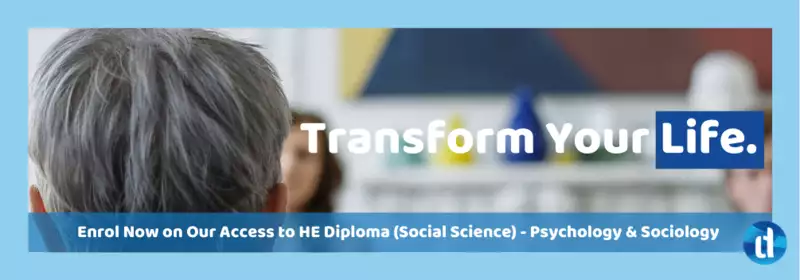Psychology is a multifaceted, pioneering social science that’s constantly discovering more about the human mind. Through psychology we are able to understand behaviour and develop techniques to improve many areas of our lives.
Whether you want to guide patients through bereavement or work alongside authorities to understand criminal behaviour, psychology can help us achieve that.
Not only is the work of a psychologist varied but the learning experience is too.
Psychology is an umbrella term that utilises knowledge from topics like biology.
This allows us to analyse behaviour from various perspectives to give us a more rounded opinion on the contributing factors. As well as making your studies more engaging.
For example, you’ll examine behaviour through nature verses nurture. You’ll analyse environmental and social factors as well as genetics to determine what influenced a behaviour or feeling.
You’ll also learn about famous historical psychological experiments such as Pavlovian conditioning or Milgram’s experiment.
It’s clear to see why understanding psychology is so popular between the opportunities for employment and the exciting course content.
Read on to learn how you can get qualified and work in the captivating world of psychology.
What does a Psychologist do?

Psychological theory can be applied to a broad range of areas, so your workday will be dependent on what you choose to specialise in.
This makes it such an exciting subject to study as there is bound to be a niche that will motivate and inspire you. Psychologists can find work in forensics, sports, counselling, clinics and in education.
Whatever career you end up in will have its own unique roles and responsibilities. Your day as an occupational psychologist, working alongside businesses will be completely different to a child psychologist’s.
An occupational psychologist would focus on motivation and increasing worker satisfaction. Whereas, a child psychologist helps children overcome challenges ranging from surviving abuse to mental health issues.
Or a sports psychologist works alongside other professionals to prepare athletes for training and improve performance.
You’ll utilise the skills you’ve learned throughout your studies to better understand thoughts, emotions and behaviours through observation, assessment, and experimentation.
Getting Qualified

If you want to become a chartered psychologist then there are certain qualifications that are mandatory. This is because work in psychology requires a high level of understanding.
You’ll need to have an undergraduate degree in psychology that has been approved by the British Psychology Society (BPS). Followed by a postgraduate qualification in a specialism of your choosing.
However, there is work in related fields that don’t require a psychology degree. For example, mental health nurses work alongside psychologists to provide care without necessarily being psychologists themselves.
Cognitive Behavioural Therapy (CBT) is another psychological practice that doesn’t require a psychology degree.
CBT is a highly successful talking therapy that still requires higher education. However, you have a wider variety of subject matter as mental-health or health and social care subjects are also accepted.
Studying psychology would also develop your critical thinking and analytical skills that can benefit any workplace.
Before university

Before applying to university it’s important you have the right qualifications to get on to a course. Any degree level study is hard work and universities need to know that you’re up for the challenge.
You will need 2 (preferably 3) A Levels or equivalent.
Psychology is desired buts not necessary and a science subject wouldn’t hurt either. Although, providing you have good academic results you’ve got a good chance of being accepted onto your chosen course.
An alternative option would be to do an Access to Higher Education Diploma. The Access to HE Diplomas are designed for anyone who lacks relevant qualifications, as a way to gain access to university.
The subject matter corresponds with the university course to give yourself the best possible start.
An Access to HE Diploma gives you everything you need to apply for university in just the one course. However, if you would enjoy a more varied learning experience then A Levels would be better.
In the end, it doesn’t matter what you choose as both are valid qualifications and entry points to higher education.
Although the overwhelming majority of universities accept the Access to HE Diploma, some do not. It’s always best to check the requirements of your desired institution before applying.
Getting back into education
If you’ve left school without relevant qualifications to get you to university then you’ll need to get back into education. Which isn’t a bad thing.
Now more than ever, universities value life experience in an applicant. They understand that mature students can draw from their personal and professional life to benefit their studies. As well as have a positive impact on younger students too.
Although it can seem daunting getting back into education, especially if it’s been awhile since you’ve been in a classroom. However, online learning could provide a solution.
Not only can you study from home whilst you prepare for university but you’re also free from the logistical nightmare of trying to fit classes into your current schedule. You’ll be able to study whenever and wherever suits you best.
What’s more you’ll be able to start learning as soon as you enrol. Whereas at a physical college you’ll have to wait for the academic year to begin to commence your studies.
On the other hand, if you’re extremely busy then you can adjust your studying to work around that. Physical classes aren’t as flexible and missing a class makes it harder to fill the gaps in your knowledge.
Wherever you choose to study and whatever route you decide to take an exciting career awaits.
learndirect is one of the UK’s leading online learning providers. Offering courses in A Levels, Access to HE Diplomas and many more. All our courses have an expert tutor for guidance and flexible payment options to help you spread the cost.
For more tips on how to prepare for online learning have a look at our blog here.
If you’re ready to start your learning journey get in touch with one of our advisors or enrol online.



















